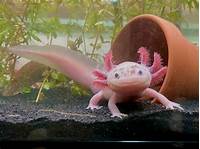Can You Have Axolotls as Pets?
Axolotls are unique and fascinating creatures that have captured the hearts of many people worldwide. Known for their adorable appearance and remarkable regenerative abilities, these aquatic salamanders have become increasingly popular as exotic pets. However, before bringing an axolotl into your home, it's essential to understand their unique needs and requirements.

Axolotl Care and Requirements
1. Aquarium Setup: Axolotls require a spacious aquarium with a minimum capacity of 20 gallons. The aquarium should have a tight-fitting lid to prevent escapes and a substrate of smooth gravel or sand to avoid impaction. Additionally, axolotls appreciate cool water temperatures between 60-68°F, so a chiller or fan may be necessary to maintain the desired temperature range.
2. Water Quality: Axolotls are sensitive to water quality, so regular maintenance is crucial. The water should be kept clean and free of debris, with regular partial water changes (20-30%) every 1-2 weeks. Additionally, it's essential to test the water parameters regularly to ensure that ammonia and nitrite levels are zero and nitrates are below 20 ppm.
3. Diet: Axolotls are carnivorous and primarily consume live or frozen foods. Earthworms, brine shrimp, bloodworms, and small fish are suitable food options. Feedings should occur 2-3 times a week, ensuring that the food is cut into small pieces to prevent choking.
4. Tank Mates: Axolotls are generally peaceful creatures and can coexist with other compatible species. However, it's crucial to choose tank mates that are non-aggressive and similar in size to avoid stress or injury. Some suitable tank mates include African dwarf frogs, cherry shrimp, and other small, peaceful fish species.
Health and Lifespan
1. Common Health Issues: Axolotls are prone to certain health problems, including bacterial and fungal infections, skin irritations, and impaction. Regular water changes, maintaining proper water parameters, and a balanced diet can help prevent these issues.
2. Lifespan: The average lifespan of an axolotl is 10-15 years, with some individuals living even longer. Providing proper care and meeting their specific needs can help ensure a long and healthy life for your axolotl.
3. Legal Considerations: In some areas, axolotls may have legal restrictions or special permits required for ownership. It's essential to research local regulations and obtain the necessary permits before purchasing an axolotl.
Conclusion
Axolotls can make unique and captivating pets, but their care requirements are specific and demanding. Before committing to owning an axolotl, thoroughly research their needs and ensure you can provide the appropriate environment and care. Ultimately, responsible ownership involves understanding and meeting the needs of these fascinating creatures to ensure their well-being and longevity.
Declaration: All article resources on this website, unless otherwise specified or labeled, are collected from online resources. If the content on this website infringes on the legitimate rights and interests of the original author, you can contact this website to delete it.





